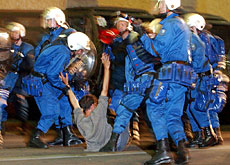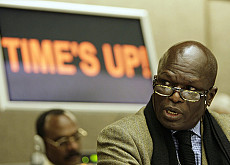Swiss police criticised for rights violations

Amnesty International has accused the Swiss police of human rights abuses and of rarely investigating these incidents or punishing those involved.
Swiss police reacted with outrage at Monday’s report, “Switzerland: Police, Justice and Human Rights”, which they described as unreliable, and vehemently denied the accusations.
At the launch of the report on Monday Amnesty said it had uncovered 30 cases in 14 cantons over the past three years in which police had committed often serious human rights violations. At least six civilians, in addition to several police officers, had been killed in these incidents, it added.
The organisation also denounced police behaviour against asylum seekers, blacks, anti-globalisation protestors, football fans and minors, who it said were victims of a disproportionate number of interventions, arbitrary detention and degrading treatment.
The use of tear gas in enclosed spaces and electroshock weapons such as Tasers were also criticised, as was the use of potentially lethal forms of constraint, such as throat holds or shackling people’s hands behind their back while they lay on their stomach.
The organisation said there was a “wall of silence” within the police about abuses.
“We have ascertained that fallible police officers are almost never punished because there has not been an independent or broad investigation,” said Denise Graf of Amnesty International Switzerland.
Graf called for the creation of an independent court of appeal, which she said was the only way for complaints against the police to be objectively examined.
Amnesty said it was also concerned by the growing number of private security firms, whose staff, it said, had a less than perfect awareness of and interest in human rights. It called for clear conditions on authorisation for these companies.
Police reaction
The Swiss police immediately rejected the Amnesty report.
“The report is marked by a mistrust of the police, the criminal authorities and the courts,” said Karin Keller-Sutter, vice-president of the cantonal police directors’ conference.
She said Amnesty was implying the police reacted disproportionately and were latently racist.
Dismissing accusations that fallible officers mostly went unpunished, Keller-Sutter said she knew “no other state service that was scrutinised and disciplined in such detail”.
She admitted that individual cases could exist, but fundamentally the rule of law was working.
Beat Hensler, head of the Lucerne cantonal police force, found Amnesty’s claims that the courts would go easy on police officers “questionable” and called the report “unreliable”.
Institutionalised racism
In March 2006 the Swiss government found itself having to answer a hard-hitting report by Doudou Diène, the Senegalese United Nations special rapporteur on racism, which accused it of racist tendencies.
Diène noted that racism, xenophobia and discrimination were “trivialised” in political debate in Switzerland.
He also observed strong evidence of institutional racism, including within the police. Allegations continued of ill-treatment, excessive use of force and racist abuse by police officers, and of subsequent impunity for the perpetrators.
The government rejected Diène’s use of “individual incidents to draw conclusions about the general dynamism of racism and xenophobia in the country as a whole”, but said it would seriously examine the report and would step up efforts to combat racism and discrimination.
swissinfo with agencies
AI was founded in 1961 by British lawyer Peter Benenson.
AI was awarded the Nobel Peace Prize in 1977 for its campaign against torture.
According to its 2007 report, AI has 2.2 million members or supporters in more than 150 countries.

In compliance with the JTI standards
More: SWI swissinfo.ch certified by the Journalism Trust Initiative











You can find an overview of ongoing debates with our journalists here . Please join us!
If you want to start a conversation about a topic raised in this article or want to report factual errors, email us at english@swissinfo.ch.